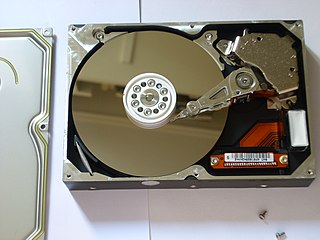
A hard disk drive (HDD), hard disk, hard drive, or fixed disk is an electro-mechanical data storage device that stores and retrieves digital data using magnetic storage with one or more rigid rapidly rotating platters coated with magnetic material. The platters are paired with magnetic heads, usually arranged on a moving actuator arm, which read and write data to the platter surfaces. Data is accessed in a random-access manner, meaning that individual blocks of data can be stored and retrieved in any order. HDDs are a type of non-volatile storage, retaining stored data when powered off. Modern HDDs are typically in the form of a small rectangular box.

A hard disk drive platter or hard disk is the circular magnetic disk on which digital data is stored in a hard disk drive. The rigid nature of the platters is what gives them their name. Hard drives typically have several platters which are mounted on the same spindle. A platter can store information on both sides, typically requiring two recording heads per platter, one per surface.

Drum memory was a magnetic data storage device invented by Gustav Tauschek in 1932 in Austria. Drums were widely used in the 1950s and into the 1960s as computer memory.

Shugart Associates was a computer peripheral manufacturer that dominated the floppy disk drive market in the late 1970s and is famous for introducing the 5+1⁄4-inch "Minifloppy" floppy disk drive. In 1979 it was one of the first companies to introduce a hard disk drive form factor compatible with a floppy disk drive, the SA1000 form factor compatible with the 8-inch floppy drive form factor.

A head crash is a hard-disk failure that occurs when a read–write head of a hard disk drive makes contact with its rotating platter, slashing its surface and permanently damaging its magnetic media. It is most often caused by a sudden severe motion of the disk, for example the jolt caused by dropping a laptop to the ground while it is operating or physically shocking a computer.
Conner Peripherals, Inc., was a company that manufactured hard drives for personal computers. Conner Peripherals was founded in 1985 by Seagate Technology co-founder and San Jose State University alumnus Finis Conner. In 1986, they merged with CoData, a Colorado start-up founded by MiniScribe founders Terry Johnson and John Squires. CoData was developing a new type of small hard disk that put the capacity of a 5.25-inch drive into the smaller 3.5-inch format. The CoData drive was the first Conner Peripherals product. The company was partially financed by Compaq, who was also a major customer for many years.

Storage Technology Corporation was a data storage technology company headquartered in Louisville, Colorado. New products include data retention systems, which it calls "information lifecycle management" (ILM).
Heat-assisted magnetic recording (HAMR) is a magnetic storage technology for greatly increasing the amount of data that can be stored on a magnetic device such as a hard disk drive by temporarily heating the disk material during writing, which makes it much more receptive to magnetic effects and allows writing to much smaller regions.

Disk packs and disk cartridges were early forms of removable media for computer data storage, introduced in the 1960s.

DataPlay is an optical disc system developed by DataPlay Inc. and released to the consumer market in 2002. Using tiny disks enclosed in a protective cartridge storing 250MB per side, DataPlay was intended primarily for portable music playback. However, it could also store other types of data using pre-recorded disks and user-recorded disks. It would also allow for multisession recording. DataPlay Inc. was founded in 1998 by Steve Volk. The company's namesake optical disc won the CES Best of Show award 2001.

A hard disk drive failure occurs when a hard disk drive malfunctions and the stored information cannot be accessed with a properly configured computer.

Storage Module Drive (SMD) is a family of storage devices that were first shipped by Control Data Corporation in December 1973 as the CDC 9760 40 MB (unformatted) storage module disk drive. The CDC 9762 80 MB variant was announced in June 1974 and the CDC 9764 150 MB and the CDC 9766 300 MB variants were announced in 1975. A non-removable media variant family of 12, 24 and 48 MB capacity, the MMD, was then announced in 1976. This family's interface, SMD, derived from the earlier Digital RP0x interface, was documented as ANSI Standard X3.91M - 1982, Storage Module Interfaces with Extensions for Enhanced Storage Module Interfaces.

In 1953, IBM recognized the immediate application for what it termed a "Random Access File" having high capacity and rapid random access at a relatively low cost. After considering technologies such as wire matrices, rod arrays, drums, drum arrays, etc., the engineers at IBM's San Jose California laboratory invented the hard disk drive. The disk drive created a new level in the computer data hierarchy, then termed Random Access Storage but today known as secondary storage, less expensive and slower than main memory but faster and more expensive than tape drives.
Tallgrass Technologies Corporation was an American computer hardware company that was the first to offer a hard disk drive product for the IBM PC in 1981. Tallgrass was a Kansas City based microcomputer hardware and software company founded in December 1980 by David M. Allen. The hard disk drive product was initially sold in Computerland stores, alongside the original IBM PC. Tallgrass added tape-backup systems to its product line in 1982.

The Commodore D9060/D9090 Hard Disks were the only family of hard drives that Commodore made for both the home and business market. The electronics are identical in the D9060 and the larger D9090 unit; the only difference is the size of the installed hard drive, with a jumper set to distinguish between 4 or 6 disk heads. Originally intended for the metal-cased PET/CBM series of computers, they are compatible with the VIC-20, Commodore 64 and later models with an adapter.

Terry Johnson was an engineer and entrepreneur notable for his work on hard disk drives (HDD). Johnson's early career included engineering and management roles in magnetic recording at IBM (1964–70) and Memorex (1971–73). He then joined in the development of STC 8000 Super Disk, a high-end rotary actuator HDD funded by StorageTek.

Intégral Peripherals, Inc., or simply Intégral, was an American computer hardware company based in Boulder, Colorado, and active from 1990 to 1998. It was the first company to manufacture hard disk drives with a platter diameter of 1.8 inches, smaller than the typical 2.5-inch hard drives used in laptops and other mobile devices. Initially met with market skepticism, Intégral found success in the mid-1990s with design wins in products by IBM, Hewlett-Packard, and Toshiba, among others. However, its investors dropping out of the company amid the 1997 Asian financial crisis caused the company to file bankruptcy in 1998, after which it was acquired by private equity firm H&Q Asia Pacific.
MiniStor Peripherals, Inc., was a public American computer hardware company based in San Jose, California, and active from 1991 to 1995. The company was the first to manufacture and market PC Card spinning hard drives, based on the 1.8-inch hard drive specification invented earlier by Intégral. The company briefly rode a wave of success in this market before dissolving amid bankruptcy proceedings in April 1995.













